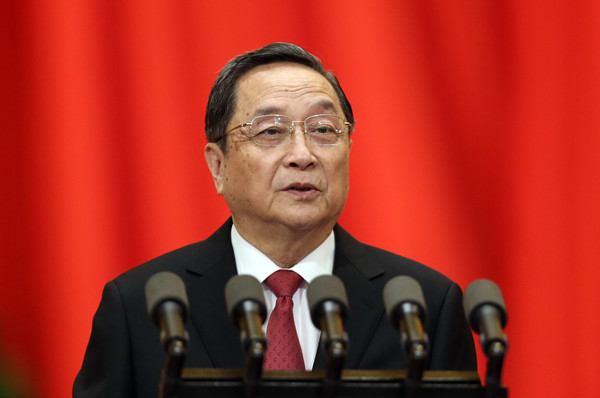 |
|
Top political adviser Yu Zhengsheng presents the work report of the Standing Committee of the Chinese People's Political Consultative Conference National Committee at the opening meeting of the annual session in Beijing on Tuesday. Zou Hong / China Daily |
Better proposals are promised as the CPPCC's annual session gets underway in Beijing
China's top political advisory body vowed on Tuesday to improve the quality of its proposals to better serve the country's reform drive.
The pledge came as the Chinese People's Political Consultative Conference opened its annual session in Beijing.
CPPCC National Committee Chairman Yu Zhengsheng delivered a work report from the committee's Standing Committee to 2,227 CPPCC members from across the country and state leaders attending the session, which will end on March 13.
Yu reviewed work for the past year, made requests for future work and raised some problems within the organization.
In his report, Yu said most of the Standing Committee's 88 inspections and surveys and 25 other activities since February last year had focused on China's reform.
They especially covered economic and political areas, such as the transformation of government functions, and State-owned enterprise, price, financial and judicial reform.
At a conference in September marking the 65th anniversary of the CPPCC's establishment, President Xi Jinping acknowledged the advisory body's indispensable contribution to the nation's development and modernization of China’s governance system.
Xi also said he hoped the organization would bring wisdom to reform and play up its role in consultative democracy.
The CPPCC collected 6,101 proposals — almost all related to topics concerning China's political, economic, social and cultural reforms — from its members and affiliated councils in the past year, of which 5,052 were formally received.
Du Qinglin, vice-chairman of the CPPCC National Committee, said that 5,046 proposals had been processed by Feb 20, with 20.6 percent of them resolved or accepted by government departments, 63.8 percent still to be resolved or accepted, and 15.6 percent to be used as reference points for work.
Yu also spoke of anti-corruption efforts in his report, for the first time in many years.
"We need to note that 14 CPPCC members, including two vice-chairmen, Ling Jihua and Su Rong, have been expelled since 2013. We must take this as a warning … and combat corruption," he said.
Chi Fulin, a CPPCC member and president of the China Institute for Reform and Development, a think tank based in Hainan province, said, "That this year is a crucial time for China's reform and economic transformation makes this year's conference very significant."
In forthcoming meetings members will organize panel discussions on key issues concerning China's reform and development and also hand in new proposals.
They will pass resolutions on the CPPCC's work in the past year and this year and discuss the Government Work Report during the third conference of the annual session of the National People's Congress, China's top legislature.
Sun Xiaochen contributed to this story.
Related Stories